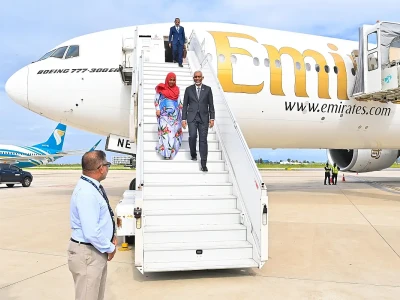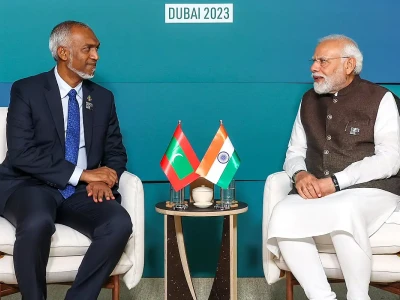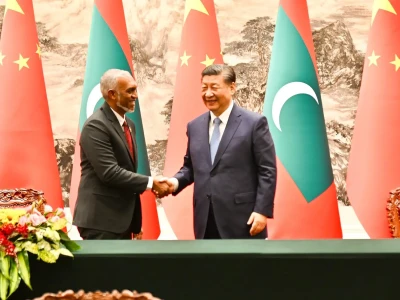
China's Belt and Road Initiative crucial for Maldives' development, says Muizzu
Muizzu told China's Xinhua that the initiative will continue to play an important role in Maldives' development.
China's Belt and Road Initiative can play a crucial role in Maldives' development, President-elect Dr Mohmmed Muizzu has said.
The Belt and Road Initiative was launched in 2013 to increase China's participation in other countries' infrastructure development.
Maldives participated in the Belt and Road Initiative during the government of former President Abdullah Yameen, in whose cabinet Muizzu served as housing minister.
Muizzu told China's Xinhua that the initiative will continue to play an important role in Maldives' development.
"Many projects have been implemented in Maldives with China's assistance. The most notable project is the China-Maldives Friendship Bridge," Muizzu said.
The bridge connecting Male, Hulhule and Hulhumale is the largest infrastructure development project undertaken during Muizzu's tenure as housing minister. China provided 50% of the $200 million as grant while the balance was arranged as concessional loan.
"This is a project that has brought a lot of convenience to the lives of many people. Not only those living in the Male region, it has brought convenience to thousands of people visiting Maldives," Muizzu said.
He also mentioned the importance of the housing projects carried out in Hulhumale with Chinese assistance.
"I think Maldives needs assistance to carry out such projects. With the assistance of China and other countries, such projects are important for Maldives and the development of the region," Muizzu said.
Opposition PPM-PNC candidate Dr Mohamed Muizzu, who advocates for stronger ties with China, defeated incumbent President Ibrahim Mohamed Solih, known for his pro-India stance, in the second round of the presidential election held on September 30.
The election campaign centred on several critical issues, including a housing crisis in the densely populated capital and the country's depleting dollar reserves. Various parties have put forth competing proposals to address the "de-dollarisation" of trade.
However, the dominant concern throughout the campaign has been the influence of India and China on the Maldives, strategically located 450 miles south of India and along vital Indian Ocean shipping routes.
China and India have a history of vying for influence in their neighbouring countries. China, thanks to its extensive financial resources and investments through the Belt and Road Initiative, initially held an advantage. Nevertheless, India has been assertive in the region in recent years.
India extended substantial financial assistance to Sri Lanka during its economic crisis last year and has expanded its presence and projects in the Maldives since incumbent President Ibrahim Mohamed Solih's election in 2018, ending the pro-Beijing Abdulla Yameen's tenure.
The opposition coalition, including Mohamed Muizzu's People's National Congress, has made criticising the current government's growing ties with India a central focus of their campaign. They have employed slogans like "India Out" and criticised Solih's decision to host a small contingent of Indian military personnel on the island.




